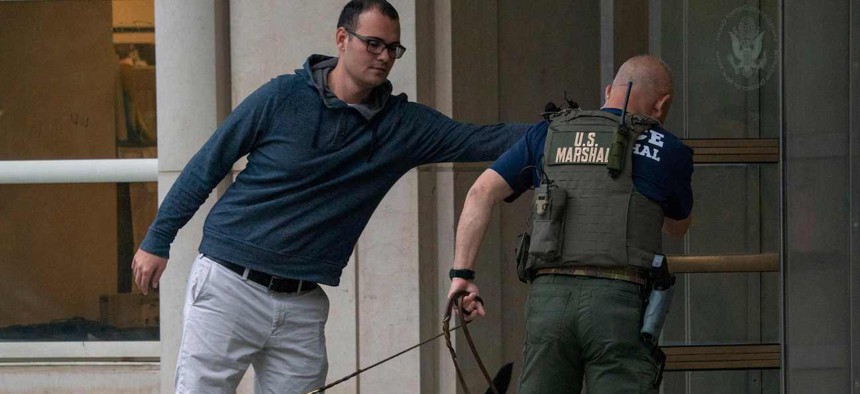
The Marshals Service houses federal pretrial detainees and is responsible for inmate transportation between facilities and courthouses. DON EMMERT/AFP via Getty Images
Following Concerns, Watchdog Advises DOJ on Ending Private Detention Contracts
The department’s inspector general says its recommendations on information sharing and documentation will ensure the proper stewardship of taxpayer dollars and that the department carries out the intent of President Biden’s executive order for the Marshals Service.
A federal watchdog advised the U.S. Marshals Service on how to better implement President Biden’s edict to end the use of private detention facilities following concerns with the handling of one facility in Ohio that potentially led to increased costs and less oversight.
The Justice Department and Marshals Service made “substantial good-faith efforts” to comply with an executive order Biden issued shortly after he came into office, said their inspector general. However, for a facility in Ohio, the Marshals Service entered into an intergovernmental agreement with a local entity, which put a third party between the Marshals Service and the contractor and continued to house the detainees at the same facility. This increased the Marshals Service’s “costs-potentially by as much as $6 million per year-and provides [it] with less direct oversight of the facility than when the [it] contracted directly with the private contractor,” said a recent report.
“As of March 2023, the [Marshals Service] continued to contract with private entities for the operation of four detention facilities under contracts that existed at the time [executive order] was issued and that are not scheduled to expire before September 2023,” the report stated. “We believe that the department and [Marshals Service] should continue to assess the concerns identified in this report to help ensure the proper stewardship of taxpayer dollars and to ensure that decision makers consider how contracting actions meet the objectives of the [executive order].”
The Marshals Service, which houses federal pretrial detainees and is responsible for inmate transportation between facilities and courthouses, entered into the intergovernmental agreement for the Ohio facility because the other available options “presented logistical issues” for the agency “and legal issues for the district court and counsel for the detainees,” said the report. The IG office was told that the White House Counsel’s Office approved the use of the intergovernmental agreement, but they couldn’t give any documentation of the approval.
Also, although the deputy attorney general’s office told the White House Counsel’s Office about the “logistical and legal issues with alternate housing for [the Ohio facility] detainees, we found no evidence that the [White House] was informed of the increase in cost to the [Marshals Service], or the reduction of [Marshals Service] control over the operations of the facility under the [agreement] compared to the cost and control under the expiring contract,” the IG said.
In March 2022, the IG alerted the Justice Department about its concerns with this and since then no other intergovernmental agreements have been entered into by the Marshals Service to address expiring contracts. Democrats on the Senate Judiciary Committee were also worried about this agreement as it “undercuts” the executive order, and shared their concerns in a letter to Attorney General Merrick Garland in December 2021.
The IG recommended that for other expiring contracts the Justice Department ensure that estimated costs and benefits for all the possible options for housing detainees are shared fully with the relevant officials and stakeholders and the deputy attorney general’s office and the Marshals Service keep documentation for all decisions and justifications on this matter.
Bradley Weinsheimer, associate deputy attorney general, wrote in a lengthy response to the IG’s office, that the DOJ and the Marshals Service agree with the recommendations, but argued there is “missing important context” to better explain the Marshals Service’s actions with the Ohio facility. For instance, the report fails to explain that “the precise costs became known literally just days before the private prison [Ohio facility] contract was set to expire, [and] that the final contract price was very similar to the lease negotiated with Mahoning County that would have not included the private prison operator running the facility.”
Weinsheimer also stated that implementation of the executive order has “sometimes created challenges and tension between the courts, the defense bar, and the [Marshals Service] because ceasing contracts with private detention facilities in some circumstances has created situations in which detainees would need to be housed at locations a significant distance from courts and counsel, thus creating difficult logistical challenges and additional expense associated with housing and transporting detainees.”
Also, the Marshals Service doesn’t own or operate its own facilities, so it has to partner with state and local governments (through intergovernmental agreements), private detention facilities and the Federal Bureau of Prisons, he noted.
Biden’s executive order followed a similar policy from President Obama that President Trump revoked. However, Biden’s order went further to include both the BOP and Marshals Service. BOP announced in December that it had ended all of its contracts with privately-managed prisons and all inmates previously housed in them were “safely transferred to BOP locations without incident.” The executive order did not apply to immigration detention centers.







